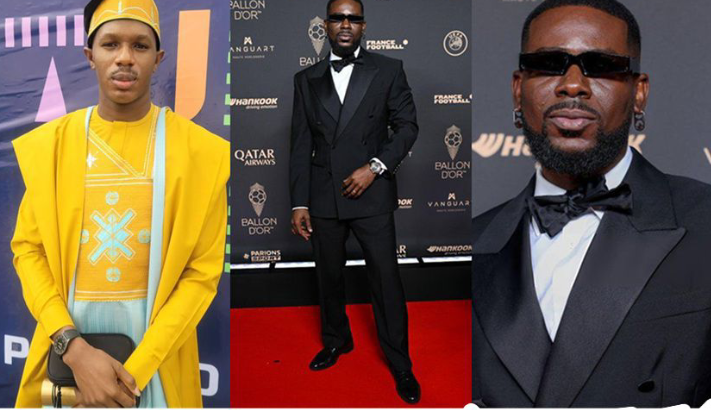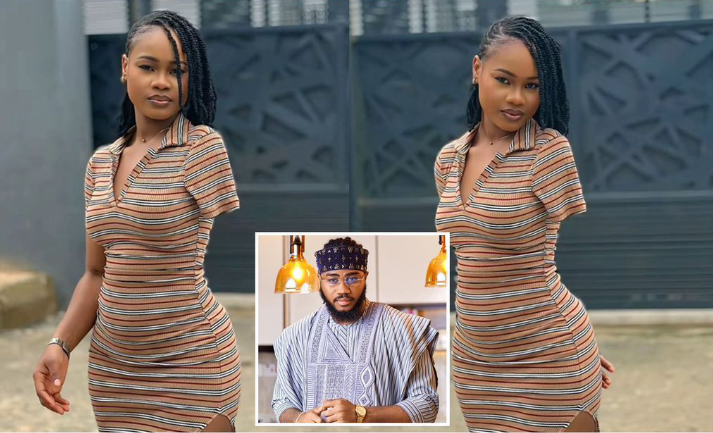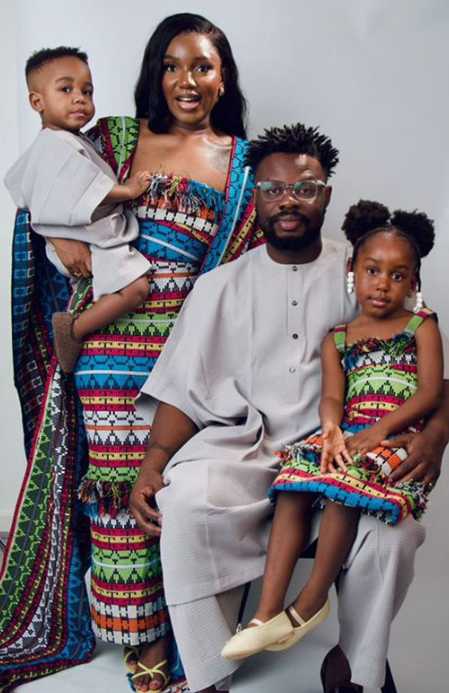
Daniel Regha Calls Out Adekunle Gold for Missing portunity to Promote African Culture at Ballon d’Or Ceremony

The annual Ballon d’Or ceremony has once again sparked online debates, not just for the awards themselves but also for the cultural statements that come with them. Nigerian singer Adekunle Gold, who attended the prestigious event, has become the subject of criticism after popular Twitter commentator Daniel Regha expressed disappointment in his fashion choice for the night. Regha, known for his sharp takes on celebrity behavior, argued that Adekunle Gold failed to use the platform to showcase Nigerian or African heritage on one of the biggest stages in global football and entertainment.
Taking to his Twitter handle, Regha wrote, “Adekunle Gold could’ve used the Ballon d’Or ceremony to promote the Nigerian or African heritage by wearing a cultural inspired outfit, even if it’s a suit made with native fabrics. Our public figures need to do better.” His statement quickly gained traction, sparking heated debates about identity, representation, and the role of African celebrities in global cultural promotion.
Adekunle Gold, known for his unique style and genre-bending sound, has often been praised for incorporating elements of African culture into his music, visuals, and performances. However, his appearance at the Ballon d’Or ceremony in a modern, Western-styled outfit has triggered discussions about whether African stars are doing enough to represent their roots when given international recognition. For Regha and many others who share his sentiment, such platforms should not just be about personal style or blending into global fashion trends but about asserting a strong African identity that the world cannot ignore.
The criticism reflects a broader conversation that has been ongoing for years about African representation on international stages. In music, film, and sports, African figures are increasingly being recognized worldwide, but many argue that they often lean toward Western aesthetics rather than showcasing the continent’s diverse and colorful heritage. For some fans, watching a Nigerian celebrity on a stage as big as the Ballon d’Or without any trace of native representation feels like a missed opportunity to celebrate where they come from.
Regha’s tweet resonates with those who believe that fashion is more than just clothing—it is a cultural statement. In a world where traditional African fabrics like Ankara, Aso Oke, and Kente have gained global appeal, critics insist that celebrities who have the platform to showcase them should take advantage. The Ballon d’Or, which commands a global audience of millions, could have been a perfect opportunity for Adekunle Gold to flaunt a suit or attire that subtly but powerfully represented Nigeria or Africa at large.
Supporters of Adekunle Gold, however, argue that the singer has always embodied his culture in his artistry and should not be boxed into wearing traditional outfits at every international event. They maintain that personal choice should not be policed and that artists like Adekunle Gold have the right to express themselves however they see fit. To them, the idea that African celebrities must carry cultural representation on their shoulders at all times is both unfair and limiting. Some fans also point out that global acceptance often requires flexibility, and sometimes blending in is just as strategic as standing out.
But Regha’s critique taps into a more emotional and patriotic nerve, one that questions how much Nigerian celebrities are willing to contribute to cultural diplomacy. Unlike politicians or diplomats, who are often deliberate in their cultural representation, entertainers may not always prioritize symbolism. Yet, given their immense influence and visibility, many Nigerians expect them to champion culture in ways that political leaders may fail to do. The argument, therefore, goes beyond Adekunle Gold himself and into a larger expectation placed on African celebrities in the diaspora.
This is not the first time Daniel Regha has taken on a Nigerian celebrity for choices that he deems lacking in cultural awareness. His social media persona has been built on holding public figures accountable, often sparking polarizing conversations. While some see him as unnecessarily critical, others view him as a much-needed voice pushing Nigerian entertainers to think beyond the immediate glamour and toward legacy and representation.
The incident also underscores the growing importance of cultural identity in global entertainment. In recent years, artists like Burna Boy, Tems, and Wizkid have all embraced elements of African culture in their performances and appearances, earning praise for exporting the continent’s heritage to the world. Burna Boy, for instance, has been vocal about being an “African giant,” often donning attire that pays homage to his roots, while also infusing Afrobeat sounds with global appeal. For many, Adekunle Gold’s choice at the Ballon d’Or feels like a step back from this growing momentum of proudly showcasing African heritage.
It is also worth noting that fashion has always played a symbolic role in cultural diplomacy. From Nelson Mandela’s iconic patterned shirts to Chimamanda Ngozi Adichie’s use of Ankara prints, clothing has been used as a tool to quietly but powerfully assert identity. In this light, Regha’s call for Adekunle Gold to wear something inspired by Nigerian or African culture at the Ballon d’Or highlights how important visibility is. A simple choice of fabric or design could have spoken volumes without the singer uttering a single word.
The debate also mirrors a generational divide in expectations. Older generations, more sensitive to issues of cultural erasure, often expect younger stars to carry the torch of tradition wherever they go. Meanwhile, younger fans, who grew up in a more globalized world, are more forgiving of their idols adopting Western styles or blending cultures freely. For them, being African is not diminished by what one wears, but rather by how one lives, creates, and represents their values.
As the dust continues to settle on Regha’s criticism, one thing is clear: the conversation about cultural identity, representation, and global platforms is far from over. Adekunle Gold himself has not publicly responded to the backlash, but his silence has left room for Nigerians and Africans at large to debate what the responsibilities of public figures really are when they step into the global spotlight. Should they be cultural ambassadors first and foremost, or should they have the freedom to express themselves however they like without the burden of representation?
The Ballon d’Or may have come and gone, but the conversation it sparked in Nigeria reveals the deep yearning for cultural pride in a world where identity is often diluted for acceptance. Daniel Regha’s criticism may not sit well with everyone, but it has forced Nigerians to reflect on what it truly means to showcase heritage in a globalized world and whether celebrities like Adekunle Gold should be held accountable for how they represent the culture.
For now, the debate rages on, with fans split between defending Adekunle Gold’s right to self-expression and agreeing with Regha’s call for more deliberate cultural representation. One thing is certain: every red carpet appearance, every international event, and every spotlight moment for African celebrities will now be watched with sharper eyes, as fans expect more than glamour—they expect culture, heritage, and pride on display for the world to see.


